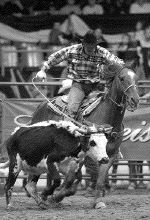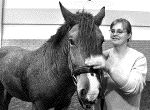
From
the |
||||||
| A bit of country in the big city Curly-haired horses, odd veggies and cowboys for all to see |
||||||
| Sharon
Dunn, National Post |
||||||
I just don't get it. Maybe it's me, but what is going on at the Royal
Agricultural Winter Fair? First I go through a room with big vegetables
-- huge pumpkins, prize-winning carrots and veggies I can't even identify,
and don't want to. I try to get enthused, but frankly, edible agricultural
products just don't excite me, even big ones.
Then I move on to the sheep room, where various piles of fleece are
displayed, looking just like the lint from my dryer, only bigger. Some
have ribbons on them, meaning they won, some don't. It must have been
fun judging those. Maybe if the fleece was in the form of a coat it could
get a rise out of me, but not in this condition.
There's the popular rabbit room, with dozens of bunnies sitting in cages.
Why are there so many? I wonder (they probably started the day with just
two).
I'm told there's great food, so I wander over to an area that consists
mainly of mall-type fast-food concessions -- Chinese, pizza and the like.
There is a fancy restaurant set up under a tent, with prices that would
make a cowboy blush. When I walk by, all of the seats are empty. Cowboys
have to win a lot of rodeos to be able to afford this place.
There are lots of booths, but I can't even get a fudge sample, "You
have to buy," I'm told. Why, that's downright unneighbourly, especially
if you don't have a media pass and have to pay the $20 adult door fee
($15 for children).
They're selling everything here, like a giant flea market, from knick-knacks
to music to vases. (I'm not just saying this because I work here, but
the only thing I got excited about was the National Post subscription
booth, where they're giving away black horsy-type blankets with every
three-month subscription.) I take out three subscriptions -- for my lawyer,
my mother and my sister, and they give me a fourth blanket by mistake.
(Of course, I'm going to keep all four.)
Next I end up in the Cavalcade of Horses, where competitions are in
full swing. A guy is riding around the arena holding a tray with a Champagne
flute teetering atop (is he a waiter or a horseman?).
But horses are the reason I've come here. I have brought my son Luke,
who has allergies, to check out the so-called hypoallergenic horse, a
Bashkir Curly, which has been bred to bring hope to horse-loving allergy
sufferers. Bashkir Curlies have been around for a while: Napoleon, when
he conquered Austria in 1805, found what he described as "poodle-hair
horses" at the Vienna Zoo and had them transported back to France.
"It's been a pretty exciting week," says owner Sonja Oakes
of Sir Charles, the curly-haired horse she has brought to the fair. "A
lot of people are coming to touch, feel, smell. They want to see if they're
going to have an allergic reaction to him." And no one has, says
Oakes proudly.
"We've had people from all over the world come to our farm [outside
of Guelph] who are so allergic to horses they want a map to the hospital
before they come. They arrive with their medical kit, (including an epi-pen
for severe allergic reactions) and a change of clothes. The worst we've
had is a runny nose."
"How are you feeling?" I ask Luke.
"Fine," he says, "no allergies." I, however, sneeze,
and my nose starts to run, I can't blame the curly, what with the hay
and other horses and who knows what else in the air.
"Certain people buy curlies for the wrong reason, as a status symbol,
and some want to buy a stallion and two mares right away to start breeding.
It's dangerous to sell a stallion if the buyer doesn't know what he's
doing," Oakes says.
Sonja and her husband, Greg, have the biggest collection of curlies
in the country, with 45 of them on their ranch. And they couldn't be happier,
for the following reasons, they tell me.
"They're not afraid, they don't bolt, they assess the situation,
they're smart," says Oakes, who then recounts the story of a curly
who was refused access to the Royal Winter Fair a few years ago.
"We didn't have our pass on us, so security said we couldn't go
in," she says, "but the horse trotted up the flight of stairs,
past the guard and through a regular people door. After we were in, the
miffed guard said, 'Obviously you belong here after all.' " She laughs
as she delivers the punchline.
Wandering around the horsy area, I run into a cowboy named Richard Thompson
who runs Horsemanship Clinics: "It's the humans who need the training,
not the horses," he says. At the clinic he teaches people how to
communicate and bond with their horse, and how to break bad habits.
"When a horse nuzzles, you think it's because he likes you,"
says Thompson, but this isn't so. "It's because he's a prey animal,
and he knows if there's danger he can knock you down and get away. He's
using you as a human shield."
Once a horse decides you're not a predator, says Thompson, he assumes
he's higher up in the food chain and the predator will eat you first.
"If you're only worth wolf bait, he'll have no respect for you
as a leader," he says. "So when a horse walks toward you, don't
back up, hold your ground. You have to get a horse to step out of your
space, not the other way around. Then they will respect you."
Thompson tells me that horses tend to look at men as predators (because
they're so aggressive) and women as wolf bait (because we're so polite).
"Horses respect men but don't trust them. Horses trust women, but
don't respect them." Sounds like another male species I know.
Thompson insists that horses are more intelligent than dogs and have
a memory, "second only to dolphins and elephants" and tells
this story to prove it: "I sold a horse in 1988 to a family for pleasure
riding. Ten years later, I saw the horse and used him for a complicated
demonstration. Although he hadn't done the routine for 10 years, he performed
it as though he had never stopped."
The most important part of the Royal Winter Fair, I'm told, is the invaluable
connections and friendships that are forged for future livestock sales.
But it turns out the Royal is not the biggest agricultural fair in the
country. Regina holds that distinction, mainly because it's rural and
Toronto isn't. But some of us have an obvious great interest in vegetables
and sheep fleece and hens and rabbits and rodeos and hogs, and everything
country. Nothing wrong with that, of course, but you must admit it is
a stretch in the big city. |
||||||
| Last
update:
May 6, 2009
© Copyright 2009, National Post Email: Sharon Dunn Email: Webmaster |
||||||

